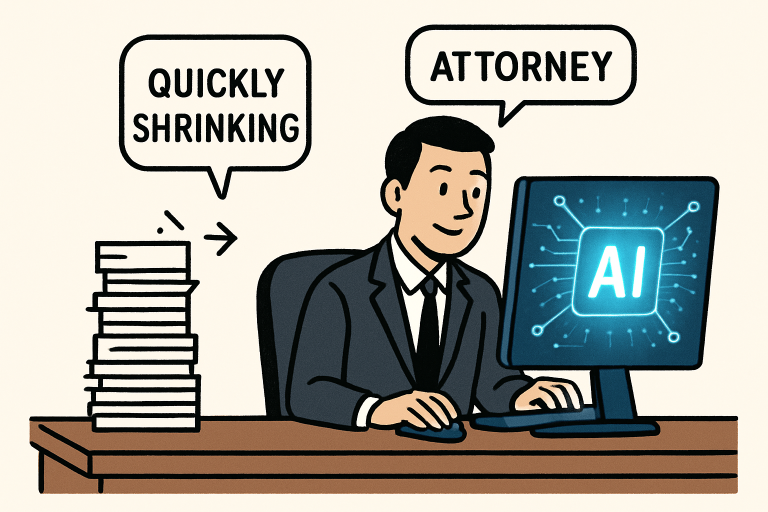Tech
Empowering Attorneys: The Benefits of AI Demand Letters in Legal Work

- AI-driven tools are revolutionizing the efficiency and accuracy of drafting demand letters for attorneys.
- Law firms leveraging AI can reduce errors, save costs, and enhance client satisfaction.
- Best practices include prioritizing confidentiality and compliance, as well as adopting transparent and tailored AI solutions.
Introduction
Today’s attorneys face unrelenting demands for speed and precision. Staying competitive hinges on leveraging technologies that streamline critical legal processes. One powerful innovation gaining traction in the legal sector is the AI demand letter. By harnessing the capabilities of artificial intelligence, attorneys and law firms can simplify and enhance the preparation and delivery of demand letters.
As clients become more results-oriented and expect quick turnarounds, law firms must adapt by embracing technology that ensures both efficiency and accuracy. AI-driven demand letters not only expedite the drafting process but also enable legal professionals to devote more time and resources to complex, strategic aspects of their cases.
This transformation is reshaping client expectations, as even straightforward disputes can benefit from efficient, technologically advanced resolutions. Amidst an evolving legal landscape, attorneys who implement AI solutions are better positioned to provide high-quality service and foster stronger attorney-client relationships.
Beyond the improvements in efficiency, these advancements also pave the way for firms to adapt to a new standard of legal practice and client service, setting them apart from competitors who may still rely on outdated workflows.
Demand letters play a vital role in the dispute resolution process. These formal documents clearly articulate the facts, legal basis, and desired outcome, often acting as the final step before litigation. Effectively drafted demand letters can encourage voluntary settlements, saving all parties the time and cost associated with litigation. Moreover, the clarity and persuasiveness of a demand letter can set the tone for subsequent negotiations, highlighting the attorney’s professionalism and command of the law.
Traditionally, attorneys invest significant amounts of time gathering supporting documents, analyzing case information, and composing a narrative that is both compelling and free of legal or factual errors. Even seasoned legal professionals may face pressure from increasing caseloads, making it difficult to maintain the highest levels of attention to detail. Any oversight in factual presentation or legal argumentation can result in costly delays or undermine negotiation leverage.

Additionally, repetitive manual drafting is resource-intensive, often diverting valuable time away from higher-value activities, such as client counseling and case strategy. This challenge has driven legal professionals to seek out tools that can replicate human attention to detail while reducing time spent on administrative tasks.
How AI Transforms Demand Letter Creation
Artificial intelligence is redefining the drafting of demand letters by utilizing natural language processing (NLP) and machine learning algorithms. Attorneys can securely upload case files, police reports, contracts, or correspondence, enabling the AI to quickly extract vital information and automate much of the letter’s construction. According to U.S. News, many firms that adopt AI tools for drafting and workflow management are finding that the technology enhances both efficiency and the quality of client service. What might have required hours now takes minutes, and the final product often contains fewer errors and improved structure.
This automation doesn’t diminish the attorney’s role. It enables legal professionals to operate at a higher strategic level. Attorneys can spend less time on repetitive tasks and more time focusing on case strategy, negotiation, and client engagement.
Benefits of AI-Generated Demand Letters
- Increased Efficiency: Attorneys streamline document creation, resolving more cases in less time and reducing bottlenecks caused by manual processes.
- Enhanced Accuracy: AI tools standardize formatting, consistently apply relevant laws and facts, and help prevent oversights or typographical errors.
- Cost Savings: Budget-conscious legal practices can reduce operational expenses by minimizing time spent on each demand letter and reallocating resources to higher-level work.
- Improved Client Satisfaction: Quicker case progress and timely communication foster trust, improving client relationships and firms’ reputations in the market.
Real-World Applications and Success Stories
Law firms that have adopted AI-assisted demand letter tools are reporting transformative outcomes. According to industry research and surveys, many attorneys find that their capacity to generate detailed and persuasive demand letters has doubled, significantly increasing their responsiveness to clients’ needs. Notably, case studies show that firms have not only improved the quality of their legal documents but also observed higher rates of pre-litigation settlements. This empowers clients to resolve disputes more efficiently and with greater confidence in their legal representation.
Leading legal publications have documented examples of mid-sized practices reducing document drafting time by over 50% after implementing AI solutions. According to Forbes, AI adoption in the legal industry is reshaping workflows and giving firms the ability to balance efficiency with precision in ways that were previously unattainable. These innovations enable firms to take on more clients, offer competitive rates, and deliver an enhanced caliber of legal service.
Considerations and Best Practices
While the benefits are remarkable, attorneys must carefully select AI tools that align with regulatory guidelines and safeguard client data. Prioritizing solutions that utilize robust security features and transparent algorithms is essential. Furthermore, attorneys should remain actively involved in reviewing and finalizing any AI-generated document to ensure that ethical and professional standards are upheld. Implementing a hybrid approach—combining AI efficiency with human expertise—helps preserve both compliance and quality, reinforcing the firm’s reputation for excellence.
Conclusion
AI-powered demand letters signal a new era in legal technology, optimizing the drafting process and amplifying attorneys’ ability to deliver timely, accurate, and cost-efficient legal service. By embracing these advanced tools, law firms can elevate their practices, delivering better results and fostering lasting client trust.
